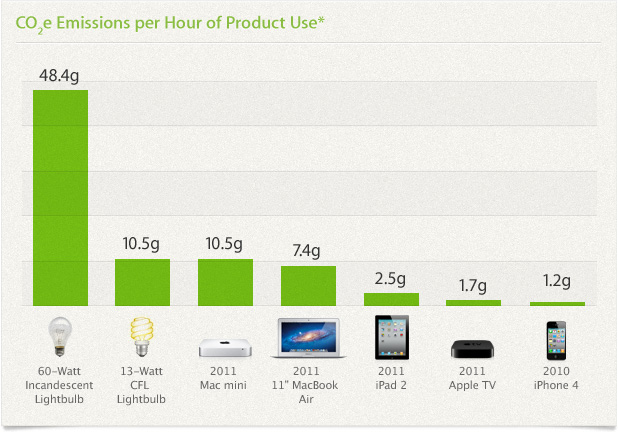Introduction
Among the hundreds of companies producing and selling consumer electronics, Apple is frequently cited as the poster child of companies partnering with factories in China that are engaged in unethical and inhumane labor practices.
“Your Conscience Calling” (shown here) was a graphic used in a February 2011 Wired Magazine article about Foxconn. The image depicts a typical factory floor at the facility where many consumer electronics products are made for Apple and other consumer electronics companies. When working conditions at Foxconn became unbearable, workers started committing suicide by jumping to their death.
The company responded by installing nets to catch people. Suicide problem solved. Yet the consumer relations problem was far from solved, and workplace conditions hadn’t changed overnight.
Ironically, the same people who criticize Apple, use Apple products and, ultimately, admit that Apple is possibly the only company doing anything about the problem.
Mike Daisey Controversy
 For example, Mike Daisey, recently interviewed on This American Life, is one of the loudest public protestors Foxconn (one of Apple’s suppliers). Daisey admits that he still owns and uses Apple products. Daisey states, “If I throw them away, I’ll just have to find another device made the same way…” [source] Daisey acknowledges that almost all consumer electronics are made in factories similar to the Foxconn factory in Shenzhen, China.
For example, Mike Daisey, recently interviewed on This American Life, is one of the loudest public protestors Foxconn (one of Apple’s suppliers). Daisey admits that he still owns and uses Apple products. Daisey states, “If I throw them away, I’ll just have to find another device made the same way…” [source] Daisey acknowledges that almost all consumer electronics are made in factories similar to the Foxconn factory in Shenzhen, China.
When asked about the pressure Apple is putting on suppliers to change their labor practices, Mike Daisey states, “I’m glad Apple does this. It’s unfortunate more companies don’t do it, and I do respect them for doing it.” [source]
UPDATE: The above story was retracted and the audio interview was removed from the This American Life website with the following message in its place: “This American Life has retracted this story because we learned that many of Mike Daisey’s experiences in China were fabricated.” [source]
Improved Manufacturing Conditions
Apple’s success in achieving positive improvements in labor conditions around the world is documented on their website, along with the violations found by their independent auditors. Apple has initiated efforts to go beyond compliance. This may be why consumer pressure is put on Apple to do more — because they are perceived as a company that can actually do something to fix the problem.
Also, because of Apple’s image as a company that sells “feel good” products and services, consumers feel it is disingenuous to offer feel good products at the cost of laborers who don’t feel good. For this reason, Apple is motivated to ensure that feeling good is experience throughout their entire production cycle.
Companies Can Demand Change
Individuals can feel helpless in dealing with global-scale issues. However, as Apple has demonstrated, a company can stop purchasing from a supplier for ethical reasons and force other suppliers to change their practices. Imagine a company choosing to drop a supplier, not because they couldn’t provide a product cheap enough (as Walmart is accused of doing), but because they couldn’t provide it ethically. If more companies would do the same, it would change the world we live in. Rather than having a race to the bottom, we’d have a race to the top.
It’s worth noting that, for similar reasons, campaigns like one launched by Greenpeace, are aimed at pressuring Apple to do more to make products environmentally friendlier. Again — not that Apple is the worst, but because Apple has shown a willingness and demonstrated competence when it comes to fixing the problem.
Consumer Choices
Your choices as a consumer are:
- Become a “technology vegan” and disconnect entirely from the digital society by living off-the-grid free of any consumer electronics. [More…]
- Or, purchase from companies like Apple that are at least putting pressure on suppliers to do better.
Further Reading
The following reading helps consumers understand and effectively respond to the problem of unjust, unethical, and inhumane labor conditions around the world. The focus is on consumer electronics, but actually involves all products.
The Population Connection. According to PopulationConnection.org, “Rapid population growth hinders progress on all Millennium Development Goals.” In other words, world living conditions decline as world population increases. This includes poor labor standards. One of the best things we can do to promote better labor practices is to decrease demand by decreasing our population growth.
The Problem of Mass Production. Supplying inexpensive food, water, clothing, housing, education, employment, cars, healthcare, entertainment, consumer electronics, homeland security, and other niceties to an increasing global population of middle-class consumers is resulting in unsustainable environmental practices and inhumane labor conditions. Mass production almost always results in massive exploitation.
A Lesson From Farming. Small-scale family-run farms can produce food ethically and sustainably without harming or exploiting the environment, humans, or animals. However, as world population increases, it’s no longer possible to economically provide sufficient food using exclusively small-scale farming methods. The mass production of food depends on the mass exploitation of field laborers and inhumane treatment of animals in factory farms — all with a negative impact on our environment. To meet demand, massive food production of crops depends on genetically modified seeds that are resilient to herbicides and other chemicals used. Animals must be pumped with antibiotics and growth hormones. Those who can afford to do so will buy peace for their conscience by purchasing free-range meats and organic foods. Yet, most people will just buy whatever they can afford.
Technology and the Environment. Although industrialization, overpopulation, and excessive urban growth have generally harmed the environment, the use of technology can help one have a smaller footprint and have a greater positive impact in the world — assuming we’re involved in socially positive activities. For example, once in place, a digital infrastructure can provide correspondence (via email), monthly bills, banking, news, magazines, television shows, movies, and music all without trucks, warehouses, factories, or storefronts. Newer products generally do more with less energy as the chart below illustrates. The 60-watt incandescent lightbulb that you use to read a book (without the use of advanced technology) produces about 40x the carbon emissions as if you’d read the book on an iPhone 4.
Technology Changes, Labor Practices Don’t. Even if we were to all go back to using pen and paper, with the incandescent bulb mentioned above, there would still be inhumane sweatshop factories where our pens and notebooks would be produced. The problem isn’t the technology, or even the suppliers who feel pressured to meet the demand. The problem is with an ever growing population demanding anything — no matter how simple — because that demand must be met by an army of underpaid laborers.
The Consumer Electronics Consumer’s Prayer. According to legend, Chief Little Deer instituted the practice of praying to a deer for pardon prior to killing it for food. [source] Today, people have the luxury of choosing to eat vegetarian and satisfying all their nutritional requirements without killing animals. There’s currently no alternative to today’s consumer electronics that would allow us to conduct daily activities of engaging in communication with others and staying informed. Today, it’s not deer that are harmed for our survival, but other humans who are exploited so we can afford to continue enjoying a technologically connected life. We live in a time (much like the Native Americans who had to kill and eat deer to survive), when it’s not feasible for large numbers of people to go on a non-electronics diet. Unless you plan to stop using consumer electronics entirely and live off the grid, you’ll continue to be supporting a world-wide industry that, at least in its current state, exploits the earth and other humans. Your television, microwave oven, mobile phone, blender, coffee machine, or other device may have been the final product made by a Foxconn worker before they jumped off the roof of a building to take their own life. Like those who continue eating meat, knowing that a life was given so that you may live, we should be solemnly aware that the technology we use on a daily basis is only economically available because others have suffered. Knowing this will cause us to be more frugal and responsible consumers, and it will prompt us to join campaigns that call for more ethical standards of production.
About Apple Products. Apple products are designed to have a longer lifespan because the hardware is made from durable long-lasting materials (recyclable glass and aluminum). The operating system is designed to be scalable and useful even after years of new products being released. For this reason, Apple products need to be replaced less frequently. This results in fewer products consumed, which in turn results in less demand on the global labor force. If world population (and demand) would decrease, Apple products would be the first products to become ethically sustainable — since they could be produced by laborers who are not overworked and asked to live in cramped dorms.
Buy an iPhone. Most consumer electronics we buy are only available through exploitative, oppressive, and inhumane labor practices. That being the case, if you depend on consumer electronics for your day-to-day activities and work, the best ethical choice you can possibly make is to purchase an iPhone. This is because the iPhone can reduce the number of devices you are using, thus reducing demand on cheap labor. A single iPhone replaces the following devices: audio recorder, photo camera, video camera, portable computer, GPS, and more.
Labor Offsets. We know that the products we buy, energy we use, and transportation choices we make have a negative impact on the environment. For this reason, the practice of buying carbon offsets has become popular. Consumers could consider purchasing labor offsets. A similar program was established by the one laptop per child program to help offset poverty around the world.
Shop Responsibly. For more information, read Shop Responsibly.
Further Reading. More about this topic is available here:
- Apple iPad plant conditions better than others (20120215we)
__________________
Document History. This document was first published on 12 Jan 2012 at 8:25 PM CST. It was revised slightly for easier reading on 2 Mar 2017 at 1:43 AM CST.
Document Global Reach. The maps below show geographical distribution of visitors to this page over a short period of time in March 2017. Click any map to show a larger view.





